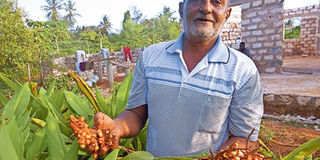Farming on zero budget

Ali Omar holds turmeric after harvesting the crop in their farm in Kilifi County. Omar, together with his colleague, use a method known as zero budget natural farming, which they adopted from India, to farm several crops, besides turmeric. PHOTO | BOZO JENJE | NMG
What you need to know:
- Zero budget helps farmers spend less as they grow crops without tilling land the conventional way and using chemical fertilisers or pesticides.
- Omar undertook an intensive natural farming training for two months at Subhesh Palekar’s farm in Karnataka state, in India, where zero budget natural farming is widely practised.
- According to Omar, whose farm is known as Pwani Organics, one first starts by selecting the block, them making trenches. The section is then mulched with fallen dried leaves mixed with cow dung.
- They also produce at least 500kg of cassava that goes for Sh30 per kilo. Tezo ward agricultural extension officer Pius Mwadziwe says conservation farming encourages crop diversification, maintenance of the soil cover without or with less interference.
Ali Omar and his agribusiness partner Yassin Yahya walk on their 12-acre farm in Tezo, Kilifi County, scouting for diseases on their turmeric plants.
Omar stops at one plant and uproots it to reveal what looks like swollen roots. He goes ahead to separate the bulbs from the roots.
The two grow turmeric, a spice in the ginger family, which is much-loved by the Asian community, using it in their food.
But growing the crop is not what makes their farm unique, the two friends use a method known as zero budget natural farming, which they adopted from India, to farm several crops, besides turmeric.
Zero budget helps farmers spend less as they grow crops without tilling land the conventional way and using chemical fertilisers or pesticides.
“We adapted this system of farming but borrowed just a few aspects of it. For instance, instead of using water found in the mulch and moisture, we irrigate our crops,” he says.
And adds, “In our case, we are growing our crops similarly to how the natural forest cover grows without external inputs and weeding,” says Omar.
In the farming method, he explains that the land is not tilled, while manual weeding and chemical inputs are avoided. “We allow plants to grow naturally and the soil is replenished by use of organic manure,” he says.
Omar undertook an intensive natural farming training for two months at Subhesh Palekar’s farm in Karnataka state, in India, where zero budget natural farming is widely practised.
“The farming is done in what is called a ‘five-layer system’ on blocks of land measuring 36 by 36 feet. The system is called five layer because one grows five different plants crops on the blocks.”
The selected block, therefore, holds some 150 different plants, with the system helping to increase soil fertility, micro-organisms and moisture in the soil.
COST-EFFECTIVE SYSTEM
According to Omar, whose farm is known as Pwani Organics, one first starts by selecting the block, them making trenches. The section is then mulched with fallen dried leaves mixed with cow dung.
“In our case, the first layer holds crops such as pawpaws, bananas, mangoes, cassava, turmeric and citrus. The second to the fifth layers have the same crops growns interchangeably,” offers the 1981 alumni of Tarasa High School.
Seasonal crops like turmerics in the cropping system provide funds to cater for the day-to-today expenses and the long-term plants offer the additional income.

The farming system's zero budget helps farmers spend less as they grow crops without tilling land the conventional way and using chemical fertilisers or pesticides. PHOTO | BOZO JENJE | NMG
“The five layer system of farming is cost-effective since expenses are only labour,” says Yahya.
The long-term crops they grow are mangoes, sour soup, custard, apples, jack fruits, citrus, figs from India, pomegranates, dragon fruit from Thailand, guava, rose apples, sapodilla and egg fruits.
Others are pepper, sweet potatoes, long cayenne, okra, pumpkins, black plum and peanuts.
To grow the cassava, the cuttings are inclined and then pushed inside the soil on land that is not weeded. Watering is done for one month until germination and cow dung manure applied at planting.
One of their challenges are black ants that affect the roots of cayenne pepper. They use plant-based pesticides and fungicides that they make on the farm through fermentation using cow dung, chilli, garlic and tobacco to eliminate them.
“We are currently selling pepper, bananas, cassava and pawpaws,” says Yahya, adding the farm is visited by agricultural students, including those from Pwani University, to learn the method of farming.
Last season, they produced about 2,000 kilogrammes of pawpaws that they sold at Sh60 a kilo to grocers, restaurants and vendors at the Mackinon market in Mombasa County.
They also produce at least 500kg of cassava that goes for Sh30 per kilo. Tezo ward agricultural extension officer Pius Mwadziwe says conservation farming encourages crop diversification, maintenance of the soil cover without or with less interference.
“Tractors are discouraged to till the land since they turn the soil killing the micro-organisms that assist in the generation of nutrients. Once they are exposed to the sunlight, the micro-organisms die,” Mwadziwe says, adding they encourage farmers to use farm-made herbicides to kill weeds and retain soil fertility.




